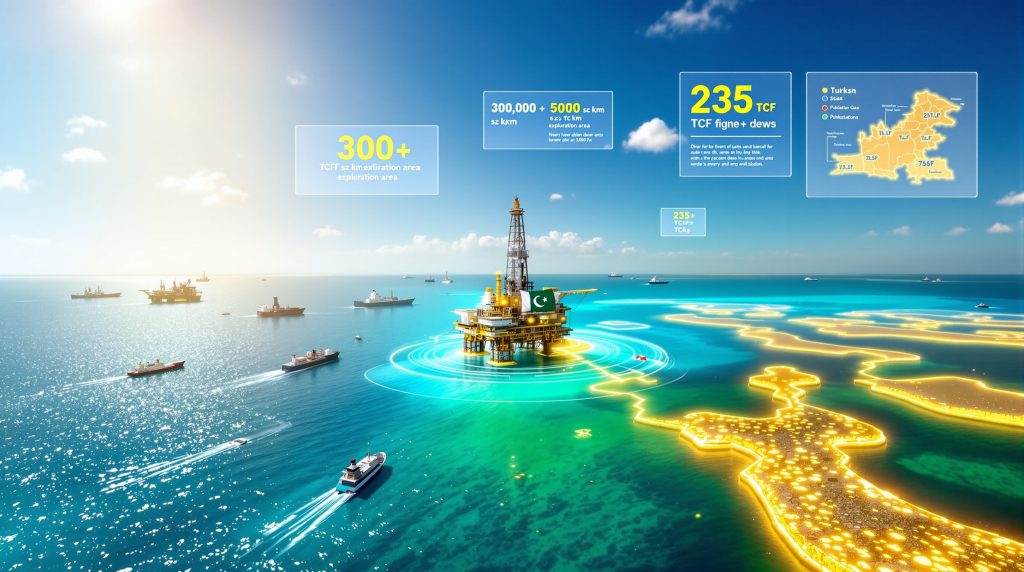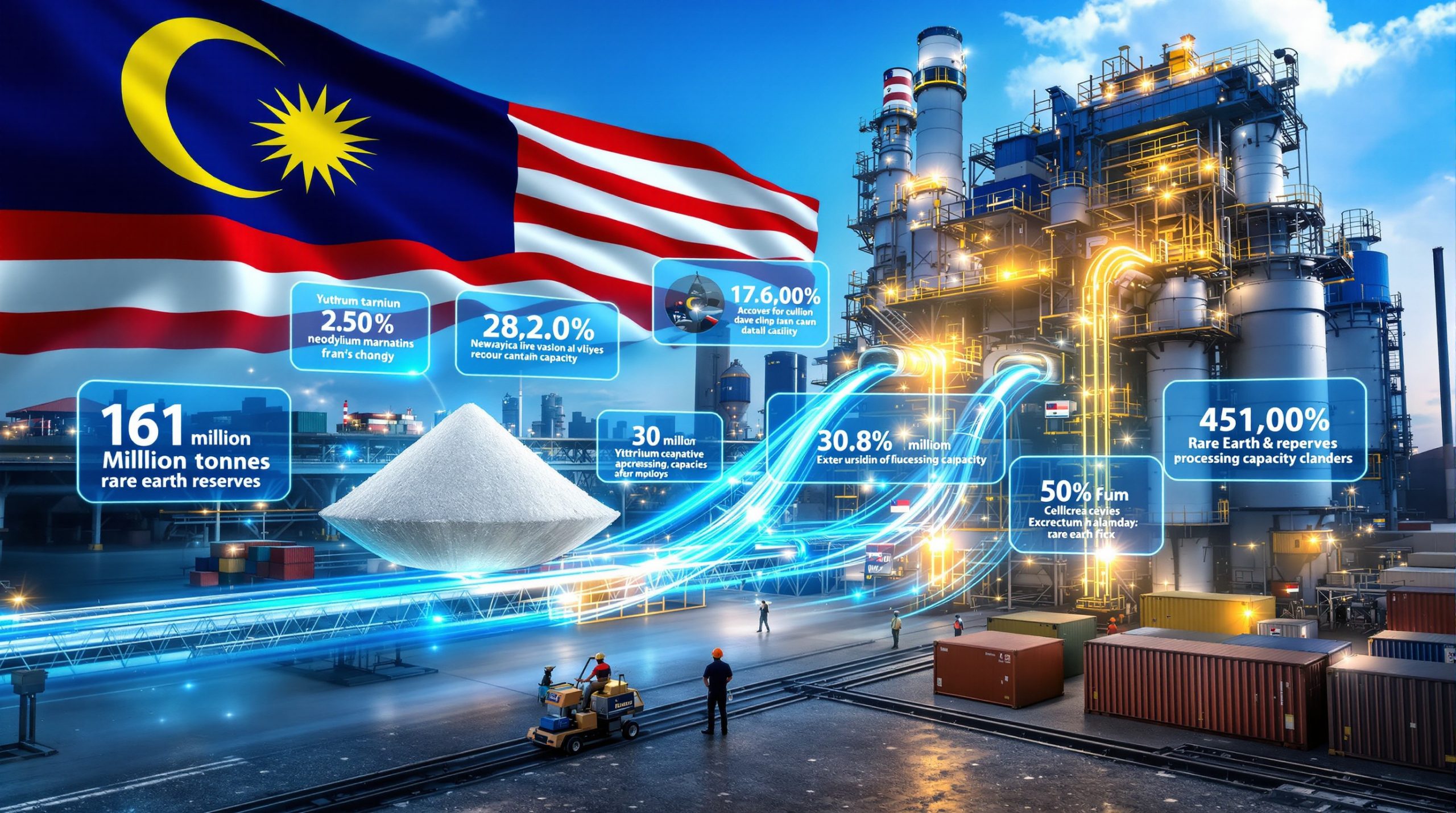Pakistan's Strategic Shift Toward Maritime Energy Independence
Pakistan's maritime frontiers represent a largely untapped hydrocarbon treasure spanning 300,000 square kilometers along the Arabian Sea. Following an 18-year hiatus in offshore activity, the nation has embarked on an ambitious revival of its maritime energy exploration, signaling a fundamental transformation in national energy policy.
The recent Pakistan offshore oil exploration bidding round achieved remarkable success, with 23 of 40 blocks awarded to interested consortiums. This 57.5% success rate demonstrates renewed investor confidence in Pakistan's energy sector potential, marking the country's most significant offshore initiative since independence.
Historical data reveals the scope of untapped potential beneath Pakistani waters. Since 1947, only 18 exploration wells have been drilled across the entire offshore zone, leaving vast sedimentary basins largely unexplored. This minimal exploration activity contrasts sharply with regional neighbors who have conducted extensive maritime drilling programs.
What Makes Pakistan's Offshore Blocks Attractive to International Investors?
Geological Potential and Reserve Estimates
Pakistan's offshore basins contain promising geological formations that warrant significant international attention. The Indus and Makran formations extend into deep-water environments exceeding 3,000 meters, creating favorable conditions for hydrocarbon accumulation.
Key Geological Characteristics:
• Sedimentary basins with proven hydrocarbon indicators
• Continental shelf areas spanning multiple geological epochs
• Structural configurations similar to productive Middle Eastern fields
• 235 trillion cubic feet of estimated natural gas resources
The positioning of Pakistan's offshore zone within a hydrocarbon-rich corridor shared with the UAE, Oman, and Iran provides additional geological context. These neighboring waters have yielded substantial oil and gas discoveries, suggesting similar potential exists within Pakistani territorial waters.
However, independent verification of geological assessments remains limited. The claimed similarities to Persian Gulf formations require substantiation through comprehensive seismic analysis and drilling data from credible geological survey organizations.
Investment Climate and Regulatory Framework
The 2025 bidding round introduced streamlined regulatory mechanisms designed to attract both domestic and international energy investment. Pakistan's new Model Production Sharing Agreement provides standardised contractual frameworks for exploration activities.
Investment Framework Features:
• Reduced bureaucratic barriers for project approvals
• Enhanced security provisions for maritime operations
• Transparent bidding processes with standardised terms
• Technology transfer arrangements between partners
The regulatory improvements address historical concerns that previously deterred international investment. However, specific fiscal terms including royalty percentages, cost recovery provisions, and tax rates require independent verification from official Pakistani energy ministry documentation.
Which Companies Are Leading Pakistan's Offshore Exploration Renaissance?
Domestic Energy Champions
Pakistan's state-controlled energy enterprises form the backbone of the offshore exploration revival. Four major domestic companies signed joint bidding agreements in April 2025, pooling resources and expertise for maritime operations.
Primary Domestic Participants:
• OGDCL (Oil and Gas Development Company Limited): Pakistan's largest exploration entity with extensive onshore experience
• PPL (Pakistan Petroleum Limited): Specialised in complex geological formations across multiple provinces
• MariEnergies: Focus on natural gas exploration and development projects
• POL (Pakistan Oilfields Limited): Expertise in conventional and unconventional hydrocarbon resources
These entities represent decades of combined operational experience within Pakistan's energy sector. However, their transition from onshore to offshore operations requires significant capability development, particularly in deep-water drilling technologies and maritime logistics.
International Strategic Partnerships
Turkey's national oil company, TPAO (Türkiye Petrolleri Anonim Ortakl), emerged as Pakistan's primary international partner in offshore exploration activities. This collaboration extends beyond commercial arrangements to encompass broader strategic energy cooperation between the two nations.
Partnership Structure Elements:
• Joint bidding agreements covering multiple offshore blocks
• Technology transfer for deep-water drilling capabilities
• Initial exploration investment commitments of $80 million
• Potential scaling to $1 billion for full development phases
The Turkey-Pakistan energy alliance reflects geopolitical dimensions beyond purely commercial considerations. TPAO brings international offshore experience that complements Pakistani domestic companies' local knowledge and regulatory familiarity.
How Do Pakistan's Recent Offshore Discoveries Compare Globally?
The Makori Deep-03 Success Story
The successful testing of the Makori Deep-03 Offshore Development Well in June 2025 marked a significant milestone for Pakistani maritime energy development. This discovery demonstrated commercial hydrocarbon production capabilities in previously untested offshore areas.
Production Performance Metrics:
| Parameter | Value |
|---|---|
| Daily Condensate Production | 2,112 barrels |
| Natural Gas Output | 22.08 MMSCFD |
| Total Depth | 3,887 meters |
| Location | TAL Block offshore area |
The discovery was announced jointly by Pakistan Oilfields Limited (POL) and OGDCL, indicating collaborative development approaches for offshore projects. Local media characterisation of this as one of the region's largest discoveries requires independent verification through regional production comparisons.
However, the production rates suggest a modest-scale discovery rather than a transformational find. Comparative analysis with regional offshore discoveries would provide better context for assessing the significance of Makori Deep-03 within broader Arabian Sea hydrocarbon development.
Regional Context and Significance
Pakistan's offshore exploration activity remains significantly below regional standards despite recent progress. Comparative analysis reveals substantial gaps in exploration intensity across neighbouring maritime jurisdictions.
| Exploration Metric | Pakistan | Regional Context |
|---|---|---|
| Total Wells Drilled (Since Independence) | 18 | 150+ per country average |
| Offshore Territory Coverage | 300,000 sq km | Varies significantly |
| Cumulative Investment Required | $5+ billion | $3-7 billion range |
| Estimated Gas Resources | 235 TCF potential | Country-specific |
The limited drilling history creates both challenges and opportunities for Pakistan offshore oil exploration. While extensive unexplored areas suggest significant potential, the lack of subsurface data increases exploration risks and costs.
Regional neighbours including the UAE, Oman, and Iran have conducted far more extensive offshore exploration programs, providing substantial production data and geological understanding that Pakistan currently lacks.
What Challenges Must Pakistan Overcome for Offshore Success?
Security and Political Stability Concerns
Pakistan's offshore exploration ambitions face substantial challenges related to regional security dynamics and political stability concerns. These factors have historically deterred major international oil companies from long-term investment commitments, particularly given the current global oil price trends.
Security Risk Categories:
• Regional terrorism threats affecting energy infrastructure
• Political instability impacting investment planning horizons
• Maritime security challenges in Arabian Sea operations
• Cross-border tensions affecting international partnerships
The security environment significantly influences project costs and implementation timelines. International investors require substantial risk premiums to compensate for perceived security challenges, increasing overall development expenses.
Financial and Technical Barriers
Offshore exploration requires massive capital investments that Pakistani domestic companies may struggle to finance independently. The technical complexity of deep-water operations also exceeds current domestic capabilities in several critical areas.
Investment Requirements by Phase:
• Exploration Phase: $80 million committed by winning consortiums
• Full Development Phase: Up to $1 billion per major discovery
• Infrastructure Development: $25-30 billion over next decade
• Technology Acquisition: Ongoing costs for specialised equipment
The capital intensity of offshore projects necessitates international partnerships to provide both financial resources and technical expertise. Pakistani companies lack experience in deep-water drilling, subsea completions, and offshore logistics management.
Why is Energy Independence Critical for Pakistan's Economic Future?
Current Import Dependency Analysis
Pakistan's heavy reliance on energy imports creates substantial economic vulnerabilities that successful offshore development could help address. The country's import profile reveals the magnitude of foreign exchange outflows dedicated to energy procurement.
Energy Import Dependencies:
• Crude Oil: 85% of total national consumption
• Natural Gas: 29% of domestic requirements
• LPG: 50% of total demand
• Coal: 20% of power generation fuel
The $17.5 billion annual energy import bill in 2023 represents a substantial drain on foreign exchange reserves. Industry projections suggest this figure could nearly double by 2030 without significant domestic production increases, particularly considering the us oil production decline affecting global supply chains.
Economic Impact of Successful Offshore Development
Successful Pakistan offshore oil exploration could fundamentally transform the country's economic trajectory through reduced import dependency and new revenue generation opportunities.
Projected Economic Benefits:
• Foreign Exchange Savings: $8-10 billion annually from reduced imports
• Government Revenues: Billions in royalties and taxation
• Employment Generation: Thousands of direct and indirect jobs
• Technology Transfer: Enhanced domestic technical capabilities
The multiplier effects of successful offshore development extend beyond immediate energy sector benefits. Reduced import dependency could improve balance of payments, strengthen currency stability, and provide fiscal resources for development programs.
How Does the China-Pakistan Economic Corridor Influence Offshore Development?
CPEC Energy Infrastructure Integration
The China-Pakistan Economic Corridor (CPEC) has already invested $62 billion in Pakistani infrastructure, fundamentally transforming the country's energy landscape. Successful offshore discoveries could integrate with existing CPEC projects to create comprehensive energy networks.
Major CPEC Energy Achievements:
• Coal Power Plants: 1,320 MW Sahiwal and Port Qasim facilities
• Hydroelectric Projects: 720 MW Karot Hydropower Project
• Wind Farms: Multiple installations in Jhimpir and Thatta regions
• Transmission Infrastructure: 660 kV Matiari-Lahore HVDC transmission line
The integration potential between offshore hydrocarbon discoveries and CPEC infrastructure could accelerate development timelines and reduce overall project costs. Existing transmission networks and port facilities provide foundation infrastructure for offshore development.
Debt Sustainability and Energy Development
Pakistan's total public debt of approximately $269 billion, including $87.4 billion in external obligations, creates both constraints and opportunities for offshore energy development.
Critics argue that CPEC has contributed significantly to Pakistan's debt burden, making China the country's largest external creditor while infrastructure projects have not yet generated expected economic returns.
Successful hydrocarbon discoveries could provide revenue streams to service existing debt obligations while funding new development initiatives. However, additional borrowing for offshore development must be carefully managed to avoid exacerbating debt sustainability concerns.
What Role Do Fiscal Policies Play in Offshore Exploration Success?
Tax Revenue Potential from Offshore Development
Pakistan's tax-to-GDP ratio of 15.7% remains substantially below international standards, creating fiscal pressures that successful offshore development could help alleviate through enhanced government revenues.
Fiscal Impact Projections:
• Current Tax Performance: 15.7% vs OECD average of 33.9%
• Energy Sector Contribution: 3-5% of GDP from major discoveries
• Revenue Enhancement: Substantial annual royalties and corporate taxes
• Economic Multiplier: Increased industrial activity and employment
The narrow tax base and widespread tax evasion among wealthy elites force the government to rely heavily on borrowing for state operations. Energy sector revenues could provide more sustainable financing for government functions.
Investment Incentive Structures
The government has designed fiscal incentives to balance revenue generation with private sector investment attraction. Furthermore, the tariffs and investment impact on global markets could influence the economic viability of these offshore projects.
Key areas requiring clarification include depreciation schedules, cost recovery provisions, profit-sharing percentages, and dispute resolution mechanisms within the Model Production Sharing Agreement framework.
How Will Pakistan's Offshore Success Impact Regional Energy Dynamics?
Strategic Positioning in Global Energy Markets
Successful offshore development could position Pakistan as a significant regional energy producer, potentially altering trade relationships and strategic partnerships across South Asia and the Middle East. This development aligns with broader energy transition & security considerations across the region.
Regional Strategic Implications:
• Reduced dependence on Middle Eastern oil imports
• Enhanced energy security for broader South Asian region
• Potential for energy exports to neighbouring countries
• Strengthened negotiating position in international energy markets
Pakistan's emergence as a hydrocarbon producer would diversify regional energy supply sources and potentially reduce price volatility through increased competition among suppliers.
Technology Transfer and Capability Building
International partnerships in Pakistan offshore oil exploration provide opportunities for indigenous technical capability development, creating long-term competitive advantages in the energy sector. Additionally, these developments must consider the us natural gas forecast and its implications for regional pricing dynamics.
Capability Development Areas:
• Deep-water drilling operations and management
• Subsea completion and production technologies
• Offshore logistics and supply chain management
• Marine environmental protection and safety systems
The knowledge transfer from international partners could establish Pakistan as a regional center for offshore expertise, potentially serving neighbouring countries' maritime energy development needs.
Technology acquisition through offshore projects could also benefit Pakistan's broader industrial development, creating spillover effects in manufacturing, engineering services, and technical education sectors.
Pakistan's maritime energy transformation represents a pivotal opportunity to address chronic energy import dependency while establishing new revenue streams for economic development. The successful award of 23 offshore blocks demonstrates growing investor confidence, while international partnerships provide essential technical expertise and financial resources.
The path forward requires sustained political commitment, continued security improvements, and strategic partnerships that balance foreign investment with domestic capability building. Success in Pakistan offshore oil exploration could fundamentally transform the country's economic trajectory, providing energy security and fiscal resources needed for sustainable long-term development.
As Pakistan navigates the complexities of deep-water exploration, the nation's ability to leverage geological advantages while addressing structural constraints will determine whether these offshore waters become a source of economic transformation or remain unrealised potential beneath the Arabian Sea.
Ready to Capitalise on the Next Energy Discovery?
Discovery Alert's proprietary Discovery IQ model delivers real-time alerts on significant ASX mineral and energy discoveries, instantly empowering subscribers to identify actionable opportunities ahead of the broader market. Begin your 30-day free trial today and secure your market-leading advantage by visiting Discovery Alert's discoveries page to understand why historic discoveries can generate substantial returns.




